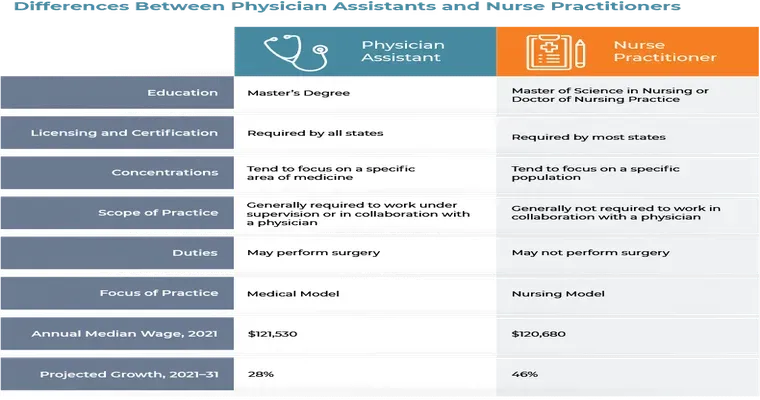When it comes to healthcare, understanding the roles of different professionals is crucial for patients seeking the best care possible. The three main categories of healthcare providers are "Nurse Practitioners", "Physician Assistants", and "Doctors". Each of these roles has unique responsibilities, training, and scopes of practice, which can sometimes lead to confusion among patients. This article will clarify the distinctions between these vital healthcare roles.
Educational Background
One of the primary differences between Nurse Practitioners, Physician Assistants, and Doctors lies in their educational backgrounds. "Nurse Practitioners" typically hold a Master's degree in nursing and have extensive clinical training. They are registered nurses who have completed advanced education and are certified to provide specialized care.
On the other hand, "Physician Assistants" (PAs) usually complete a master's degree from an accredited PA program. Their training often includes a combination of classroom instruction and clinical rotations in various medical fields. This allows them to gain a well-rounded understanding of patient care.
"Doctors", specifically those who are Medical Doctors (MDs) or Doctors of Osteopathic Medicine (DOs), undergo the most extensive education. They typically complete a bachelor's degree, followed by four years of medical school, and then complete a residency program that can last anywhere from three to seven years, depending on their specialty.
Scope of Practice
The scope of practice for each role also varies significantly. "Nurse Practitioners" have the ability to diagnose and treat many medical conditions, prescribe medications, and manage patient care independently in many states. They often focus on holistic care and patient education, making them valuable resources in primary care settings.
"Physician Assistants" work under the supervision of a physician and can perform many of the same tasks as doctors, including diagnosing illnesses, creating treatment plans, and assisting in surgeries. However, their practice is more collaborative, and they often consult with supervising physicians for complex cases.
"Doctors" hold the highest level of authority in the medical field. They can perform surgeries, prescribe medications, and are responsible for the overall management of patient care. Their extensive training allows them to handle complex medical conditions and make critical decisions regarding treatment.
Patient Interaction and Care
When it comes to patient interaction, "Nurse Practitioners" often emphasize a patient-centered approach, spending more time with patients to understand their health concerns and educate them about their conditions. They are particularly known for their focus on preventive care and chronic disease management.
"Physician Assistants" also engage closely with patients, but their role may involve more direct collaboration with physicians in treatment decisions. They often serve as a bridge between patients and physicians, ensuring seamless communication and care coordination.
"Doctors", while also interacting with patients, may have less time due to their broader responsibilities. However, they are the ultimate decision-makers in a patient's care, providing expert guidance and treatment plans based on their extensive medical training.
Conclusion
In summary, understanding the differences between "Nurse Practitioners", "Physician Assistants", and "Doctors" can empower patients to make informed decisions about their healthcare. Each of these professionals plays a crucial role in the healthcare system, offering unique strengths and expertise. By recognizing their distinct qualifications and scopes of practice, patients can better navigate their healthcare options and seek the right provider for their needs.





